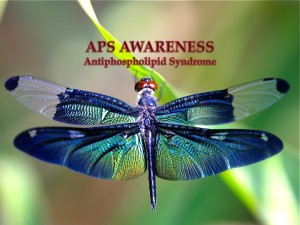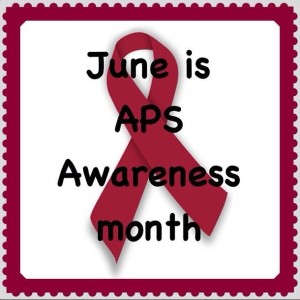What the *^## is Antiphospholipid Syndrome–APS?
I felt like the doomed heroine of a bad sci-fi flick, zapped by zeta rays from planet Krypton when, a few weeks after my stroke, I first heard my unpronounceable, incomprehensible diagnosis: ‘antiphospholipid syndrome.’ I’d never heard of APS. Nobody I knew had ever heard of APS, even most of my doctors had never heard of APS. Many of them still havn’t. Excerpt from Anne’s memoir
 APS is sometimes called “sticky blood” because it causes an increased tendency to form blood clots in the veins and arteries. Clotting can lead to serious health complications ranging from miscarriages and migraine headaches to blood clots in the legs, in the lungs, heart attacks or, in my case and many others’, stroke.
APS is sometimes called “sticky blood” because it causes an increased tendency to form blood clots in the veins and arteries. Clotting can lead to serious health complications ranging from miscarriages and migraine headaches to blood clots in the legs, in the lungs, heart attacks or, in my case and many others’, stroke.
Here are some important facts about Antiphospholipid Syndrome:
- APS is a blood clotting disorder that causes the blood to clot when it shouldn’t.
- It does this by signaling the immune system to make antibodies to attack blood proteins called phospholipids (phos-pho-lipids). These proteins help moderate the body’s natural blood-clotting process so it stops when it should. Thus the name: anti (against) phos-pho-lipids.
- I think of it this way: the APS antibodies are like out of control PacMen, dashing through my blood gobbling up the good little minions who help put the brakes on my clotting system.
- In the UK, APS is called Hughes Syndrome, named after Dr. Graham Hughes, the professor and Lupus specialist who first described APS in 1983. I rather wish we called it Hughes Syndrome in the US, too. It’s a lot easier to learn and think about something I can pronounce.

- APS is a common cause of miscarriage, blood clots in the legs (deep vein thrombosis), the lungs (pulmonary embolism), the heart (heart attack), and the brain (stroke).
- APS is also an autoimmune disease, because the antibodies that attack our blood proteins are attacking parts the ‘self’ instead of invading organisms like virus and bacteria.
- Like lupus and other autoimmune diseases, APS can “flare” at times, causing weakness, fatigue, achy muscles and joints, especially when we’re tired or stressed.
- Because most patients with APS take some kind of bloodthinner, we must try hard to avoid bleeding accidents. For some of us, this is one of the most vexing aspects of the disease: walking a line between blood that’s so “thick” it causes clots, or so “thin” it causes abnormal bleeding.
- APS is sometimes found in conjunction with other autoimmune diseases, particularly lupus. It’s estimated that 50% of Lupus patients also have APS. (Johns Hopkins Lupus Center)
- APS can also occur on its own. This is called primary APS.
Learn more about antiphospholipid syndrome on the APS resources page.
Coming up—Information on:
- APS symptoms
- How APS is diagnosed
- How APS is treated
- Clearing up confusion about APS: Questions I frequently hear from other patients
- Resources for APS patients
- Blood thinning: it’s more complicated than it looks
- Living with Coumadin
- Why I rejected the new blood thinners like Xaralto.


